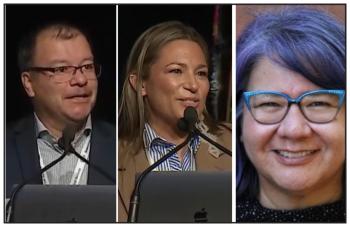Image Caption
Summary
Local Journalism Initiative Reporter
Windspeaker.com
Heated comments this afternoon over details for electing the next national chief for the Assembly of First Nations resulted in ousted national chief RoseAnne Archibald getting banned from the rest of AFN’s three-day general annual assembly in Halifax.
Chiefs were discussing an emergency resolution put forward by Tk'emlúps te Secwépemc Kukpi7 Rosanne Casimer and Abegweit First Nation Chief Roddy Gould that would see an election held at the December Special Chiefs Assembly. The winner would then serve an extended term of three and a half years with the term ending July 2027. The usual term for the national chief is three years, with elections held in July.
However, with one year left in Archibald’s three-year term and New Brunswick regional chief Joanna Bernard selected as interim national chief for six months, the new national chief would be required to conclude Archibald’s term as well.
Archibald was attending virtually as voting proxy for Homepayne First Nation Chief Ron Kocsis. She also received extra time to speak when Ts’kw’aylaxw First Nation Chief Justin Kane gave her most of his allotted three minutes when he stood to address the chiefs.
Archibald told the assembly that the room was full of “hatred, resentment and a myriad of negative feelings” which had been created by the regional chiefs manipulating chiefs.
“What has happened to me is not what you do from a place of love. What has happened to me has come from hatred,” she said.
Co-chair Adam Fiddler asked for Elders and knowledge keepers to smudge the room as a response to Archibald’s comment.
He also reiterated words spoken in the opening prayer by Elder Edward Perley, as well as opening remarks about respectful conversation and honouring the seven sacred teachings.
When Archibald spoke for a second time, she referenced Fiddler’s comments as “lateral violence” and disrespectful. She implored chiefs to “let go of this hatred in your heart.”
She said instead of passing a resolution for a new election, they should be passing the second resolution that wasn’t allowed on the floor when she was voted out of office on June 28. That second resolution endorsed her continued role as national chief.
Fiddler consulted with his co-chair Wina Sioui after Archibald’s remarks.
Sioui then cited the “discretion of the chairs related to rules pertaining to …orderly conduct” and said “Really, really, it’s very difficult.” Archibald was then expelled from the assembly.
In a tweet, Archibald responded by saying, “Due to #truth telling, I have been blocked from participating as a proxy…”

Later in the day she tweeted that she would be “taking time to reflect on the events” and would be taking a break from social media.
Chiefs and proxies did have concerns about the emergency resolution regarding the next election for national chief, but those concerns did not extend to Archibald being removed from the meeting or as national chief.
Concerns centred on the length of the time the new national chief would serve.
Regena Crowchild, proxy for Tsuut’ina Nation, pointed out that the AFN charter stated a national chief’s term was for three years and suggested Bernard serve as interim chief until July 2024 when the next election was naturally slated to occur.
While that was “doable,” said AFN legal counsel Adam Williamson, he pointed out that the June 28 resolution that came from the executive committee set the election date for the new national chief for December 2023. He said it would require a change to the June 28 resolution.
Drew Lafond, proxy for Muskeg Lake Cree Nation, challenged the length of the term as well and asked if the charter would have to be amended.
Williamson said the precedent had already been set when former national chief Shawn Atleo resigned before the end of his term and incoming national chief Perry Bellegarde served a three-and-a-half-year term. In between, Quebec and Labrador Regional Chief Ghislain Picard served as interim national chief for six-and-a-half months.
Williamson said it was an “unwritten convention that has been followed before.”
It took over an hour for 171 chiefs to finally pass the resolution which will see them electing a new national chief in December. One hundred and forty-three chiefs voted in favour with 28 in opposition.
Speaking in the morning, Bernard said it was her hope that the AFN continued to see “strong women leaders.”
“We should focus on selecting a candidate who was guided by unity and shared vision of a brighter future regardless of gender,” said Bernard. “We must not lose sight of broader goals…that we strive to achieve together.”
Archibald’s election in 2021 was the first time a woman had held the position.
But trouble has plagued her time in office culminating in an independent human resources investigation into allegations for the harassment of five people. The investigation upheld two of those complaints and found that Archibald had retaliated against all five complainants. She was also found to have breached the AFN’s Whistleblower Policy by making public statements.
On June 28, one-third of eligible chiefs or their proxies (231) voted, with 71 per cent supporting a resolution to immediately relieve Archibald of her position in leading the largest Indigenous advocacy organization in the country.
Local Journalism Initiative Reporters are supported by a financial contribution made by the Government of Canada.

